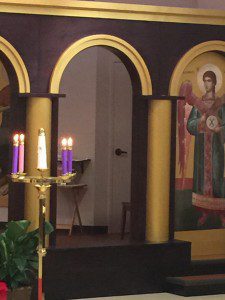“My hope is built on nothing less than Jesus’ blood and righteousness . . .”
So went the hymn from my childhood and it is stuck in my head today along with the versions my Mother and I invented when we sat in hospital waiting rooms waiting for Dad to visit the sick of our church.
“My hope is built on nothing less than bubble gum that is sugarless. . . “ suggested our aversion to the dentist.
Surely nothing dates us more firmly as a family of the 1970s than our political song: “Our hope is built on nothing less than Kissinger and his finesse. . . “
This game can go on endlessly and if nobody else was amused, like poor Dad who had to hear our cleverness, I remember coming to enjoy hospital visits with my witty mother. Someday I will unlock the amusement of Gladys and her glue bottle, but the world is not yet ready. We were wags in our day.
And this brings me back to the true song and something I have never understood about secularism: a denial that without the shedding of blood some things cannot be repaired. How barbaric somebody is tempted to say, forgetting to understand a different culture before judging it, but I never found it so. It was not fearful because it was simply true.
Perhaps being a pastor’s kid meant birth, sickness, and death were not foreign to me. We lived up a hill from a funeral home and Dad would perform burial services for those who had no pastor. Funerals were sad times, but also times when families met, food was eaten, and stories (usually familiar stories) were told.
I miss my grandparents, all gone now, but I do not mourn as if there was no hope. They had to die to live. Nothing in my life that was any good ever came without effort, pain, and often blood (if the effort needed to be physical) . . . either mine or another’s sacrifice. That was true of my bloody birth, naturally. It was true of learning to walk when I got skinned knees and riding a bike when I got gravel that is still in my elbow.
The pain was a natural prelude to the pleasure. I did not seek it, but it was not surprising when it was there.
This was even truer when I sinned, pardon the use of this old fashioned word for being bad. I had to turn away from the sin, show I was sorry, and this usually meant putting reality into my repentance. If I had told a falsehood (the worst thing to do in my house), I must go and tell the truth. If I had taken something that was not my own, I had to make restitution. If I had hurt someone, I had to apologize and then serve them quietly as I could to help heal the pain.
The greater the misdeed, the greater the time and work required to rebuild trust and love. My parents never rejected me, they always loved me, but they never pretended that “sorry” was enough. It was not: somebody had to help make the part of the world straight that I had made crooked.
Often that somebody was my Dad or my Mom. I was a kid and they were the parents, so when I misbehaved (willfully!) in public and broke something or hurt somebody, they paid the bill. I was their son and so they took responsibility, even though Dad was not that well paid and he did not need further work.
He came when I was in trouble in school and associated himself with my failures and when I saw him suffer mentally, “shedding his blood” (metaphorically, but so much harder than physical pain!), as he helped clean up my messes, I vowed to do better. And I often did.
The younger I was, the less the payment fell on me and the more it fell on them, but payment there always was.
And so I look at the deepest problem of my being and know I cannot save myself. I can only laugh because like the horrid commercial: “I have fallen and I cannot get up.” Somebody is going to have to help straighten the crookedness I have made because I am incapable.
And so God did not demand that we do something we could not. He came Himself and did it. He made a way for the crooked to be straight by dying a timeless death that took all the pain of the human past and future on Himself. He faced it all from the first murder to the last. He felt every bit of human suffering until all of it was transformed by love. We have access to that grace.
He came and bled so I do not have to do so.
This is so profound, so joyous, that we loved to sing it. At times, the great sacrifice provoked mourning and bowed heads. It has made me weep, but usually it sets me free, makes me laugh, and makes every other human goodness seem small. I become jolly, child-like without childishness.
I like sugarless gum, but not that much.
Kissinger is pretty clever, but not that clever.
Disneyland is happy, but not happiest.
I was not clean, but I can become clean. I have hope for the future even when I live a real human life: born in blood, living with blood, dying in blood, and brought to life again by the blood of Jesus.
“My hope is built on nothing less, than Jesus’ blood and righteousness.!”











